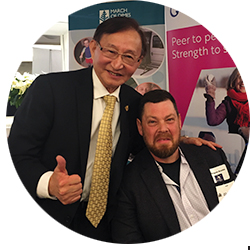A vast region. Remote locations. Fly-in communities. Close ties to the land.
There isn’t one phrase to describe the Thunder Bay and surrounding area that Spinal Cord Injury Ontario’s Regional Services Co-ordinator Morgan Austin oversees. It is an immense territory marked by diversity, complexity and, sometimes, extremes. City dwellers and isolated populations. Varied cultural backgrounds, including indigenous communities. Places where roads end but settled areas continue on. Logistical challenges in accessing goods and services. Extreme weather for months on end. Breathtaking beauty year-round.
“There are a lot of differences in people, cultures and regions out here,” says Morgan. “My role is to help each person who needs our services to navigate the health care and support system – from the first moment of injury to wherever they want to go in life. A big part of what I do is help people identify their own barriers – to returning home, education, work, achieving life goals. I see myself as a translator of a large system and a problem solver.”

To succeed in his role, Morgan holds one principle in mind above all others when working with clients from the moment of injury onward: listen and learn. “My work is based on relationships,” he says. “And relating to people in the north means sharing stories. Every person moves through their journey after a spinal cord injury in their own way. Some of those differences are rooted in culture and some are individual. I need to learn before I can help. Especially when it comes to working with indigenous communities. There is a history of colonialism in the health care system, just as everywhere else in this country. It’s a very complicated situation. Approaching people in a respectful manner means being aware of past histories. It means listening first.”
Morgan’s goal isn’t just to provide access to services but to help clients develop the skillset they need to succeed at their own goals. Given the vastness of the region, that path varies greatly from person to person and place to place. Some clients plan to return to their office job in the city; others want to continue to hunt, fish and trap on the land year-round. Some can be picked up at the hospital and driven home to begin the next stage of their recovery; others fly back to a remote community and receive ongoing support there.
“Space and distance provide their challenges,” says Morgan. “Travelling to receive services can be hard – long distances and difficult weather at times. And passing along goods can be hard. We had one client living in a remote area who needed a ramp for his home. It was designed at our end, so we could send the right lumber and build instructions. Then we fundraised for the cost of the wood and the cost of flying it in. We also had to consider, who is going to build it – is there a family member, a friend? Communication can be slow, as lots of people in this region don’t have computers or internet access. It took months to get this ramp designed, paid for, sent and installed. If you live in Toronto, you don’t face these logistical complexities.”
The hospitals and health centres in the Thunder Bay region also do not have the support networks that can be found in a large city. It’s a changing health care landscape where even the service providers are struggling with time, distance and funding. Morgan maintains relationships with partner organizations, services and individuals across the region to co-ordinate support. Sometimes he needs to call on a chain of contacts to transport something like a wheelchair from the city to a client. The chair may hitch a ride on several vehicles driven by people who don’t know the client personally and aren’t part of the health care system but are willing to help along the journey.
Logistical challenges, access to rehab and regular health care, modifications to homes never seen, communication difficulties, variability in client culture and lifestyle – these are the daily challenges Morgan faces. It can be frustrating work at times. “Things can move slowly,” he says. “And there are limited resources. But I consider this work to be a gift. I spend a lot of time getting to know people during a difficult period in their life. Being able to advocate for them is the most enriching part of my work. My role is to see two, three, four roads ahead for systemic navigation of the whole system. My role is also to be led and guided by the client. I’m passionate about those relationships and advocating on their behalf.”
Originally from the south, Morgan has been living in the Thunder Bay region and building those relationships for 15 years now. “I admire the fabric of the people here,” Morgan adds. “There is so much resilience and strength in everyone I have met. And a tremendous sense of community. To be successful in this work, you need to have a footprint in the community. Being involved, attending events, playing sports, sharing stories, knowing as many people as possible. That’s a big part of what I do. And I consider it a privilege.”






